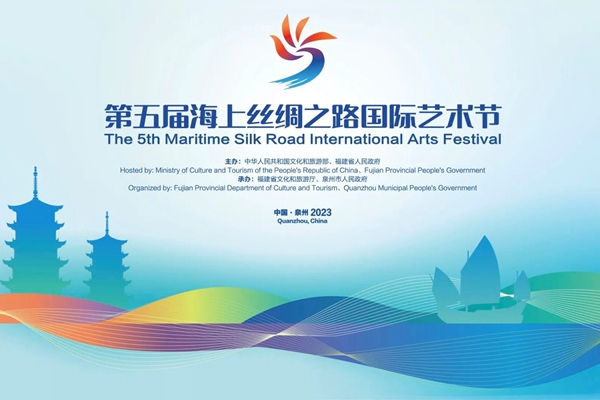Floral ornaments crowning attraction of fishing village
 Traditional costumes and zanhua headdress are exhibited on March 8 at a fashion show in Quanzhou, Fujian province. [ZHANG BIN/CHINA NEWS SERVICE]
Traditional costumes and zanhua headdress are exhibited on March 8 at a fashion show in Quanzhou, Fujian province. [ZHANG BIN/CHINA NEWS SERVICE]
Star attraction
Huang spoke with China Daily on March 9, the same day the village held a grand celebration and worship ceremony at Mazu Temple. During the event, which is held on the 29th day of the lunar calendar every year, participants seek blessings from Mazu — the goddess and protector of seafarers. To mark the annual occasion, village women turned out in traditional costumes that featured the floral head decorations.
Huang said the head ornaments his business offers to tourists are quite different from the zanhua that his mother's generation had worn.
In the past, women of the village rarely cut their hair. Huang said as far as he knew, his mother only cut her hair twice in her life — once when she turned 14, as part of a ceremony to mark her becoming an adult, and the other time when she got married.
"Now, when tourists come to us, we usually have to use wigs since most of the tourists' hair is not long enough to turn into a bun," he said.
To have the zanhua appear more colorful, he usually combines real flowers with artificial ones. In his mother's time, women usually wore real flowers, and used different types of flowers to distinguish married women from single ones.
Huang said the rise in tourist visits had not only made him happy from a business perspective, but also because more people were starting to learn the history and culture behind zanhua headwear.
"Earning a reputation for their hard work, resilience, and compassion, the women of Xunpu are renowned for harvesting the highest quality seafood. They deliberately adorned themselves with floral headpieces not only for beauty, but also as a symbol of happiness," said Huang.
He said his mother was like most of the hardworking women in the village. "They took care of their families, raised the children, and did as much as they could to make extra income to support their families, while their husbands caught fish in the ocean," said Huang.
"When they put a zanhua on their heads, they expressed their wish to pursue happiness. The flowers are seen as a symbol of hope," he added.
Respecting tradition
Yin Siqi is one of Huang's customers and posts travel and food videos about the village on her social media platforms. Born and raised in the Guangxi Zhuang autonomous region, Yin learned about Xunpu and its culture after moving to Quanzhou to study at university.
She paid her first visit to the small village in 2019 and met Huang. "There is a beautiful coast near the village and it's easy to find Huang's home because of the oyster shell house his family lives in, which is very noticeable," said Yin, 35, who now lives in Quanzhou after graduating and becoming a social media influencer.
One of the things that impressed Yin was the story of Huang's older sister, who married a Moroccan man and had a grand, traditional wedding in the village.
"I saw pictures of Huang's older sister's wedding. She wore very traditional clothes and a zanhua, which looked very beautiful. The couple looked very young. It was very touching that the bride respected her background and family traditions and the groom also loved the unique culture," Yin said.
In 2021, Yin donned a zanhua for the first time at Huang's salon. Huang's mother put flowers on Yin's bun, which formed a circular shape that symbolized unity, perfection, and completion.
Yin returned to the village several times and took photos of herself in traditional Xunpu dress and wearing a zanhua. One of her social media posts received over 40,000"likes" and was viewed more than 2 million times. Her photos also attracted invitations from the media for interviews as well as advertising companies to cooperate on endorsements.
"I have seen many young people come to Xunpu for zanhua. They match the head decorations with their own style, especially Chinese-style clothes such as the traditional skirt called the mamianqun, which literally means 'horse-face skirt' and is one of the favorites among younger generations," Yin added.

 5th Maritime Silk Road International Arts Festival
5th Maritime Silk Road International Arts Festival 